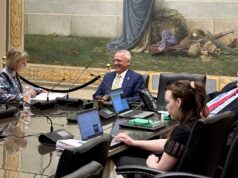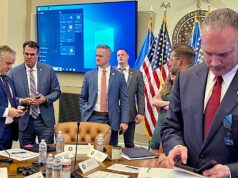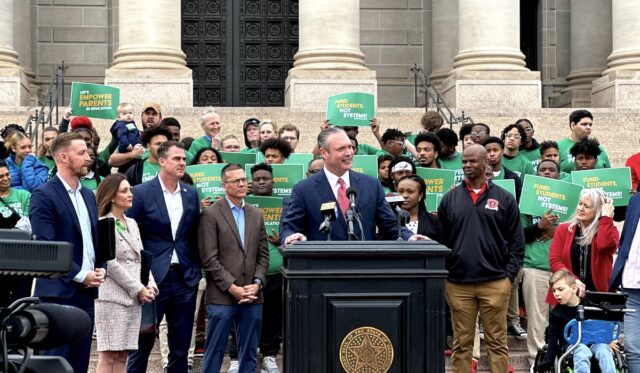

As Republican leaders of the Oklahoma Legislature negotiate their competing versions of a new refundable tax credit paid to families who send their children to private schools, prominent senators have proposed a $7,500-per-student credit with an eligibility cap of $250,000 in annual household income. The House’s version, however, proposed a $5,000-per-student credit with no income cap for eligibility.
Now, with the rest of the session’s budget negotiations delayed until an education agreement is reached, leaders of the House, Senate and Gov. Kevin Stitt’s administration have been kicking around alternate parameters for the controversial private school tax credit in an effort to strike a deal.
Among other ideas, negotiations have at least briefly included concepts aimed at prioritizing private school access for lower-income students, phasing in an income eligibility cap, or capping tax credit eligibility based on a school’s tuition cost instead of a family’s income.
“At this point, our perspective is kind of, ‘Pass anything, pass something.’ We need universal school choice, particularly for the kids in the lower economic bracket, and we think that any version of what has been proposed in one of the chambers will help out a great deal,” said Brett Farley, executive director of the Catholic Conference of Oklahoma. “This is the first time in history where both chambers have proposed something that is really similar, so to miss this opportunity would be an incredible failure on the part of leadership.”
While private schools around the state have similar hopes to Farley’s, there is no organized private school association lobbying at the State Capitol. That has placed Farley in a position to be consulted by Republican leaders of both chambers.
“I’ve had conversations with leadership here and there just to make sure that they understand where we are at, and that’s what we’ve told them: Get something on the books that you are willing to agree on,” Farley said.
If what legislators are willing to agree on is tax credit eligibility based on a private school’s tuition cost, Farley said he would support it.
“We’re not championing it, but if that’s what gets them across the finish line to a compromise, then we’ll take it,” Farley said. “Our goal is to get something passed. We’re open to just about any compromise to get that done because failing with this much progress down the road is unacceptable. So pass anything.”
‘One of the issues that’s always been a problem’

Not everybody in the Legislature is so keen on lawmakers passing “anything” to create the new refundable tax credit for private school enrollment.
Rep. Mark Vancuren (R-Owasso), who serves as vice chairman of the House Common Education Committee, voted against HB 1935 and HB 2775, which proposes the $500 million in new education funding.
A former high school biology teacher and basketball coach, Vancuren said his district broadly opposes creating tax credits to incentivize private school enrollment, and he said it’s unlikely any of the possible parameters being negotiated — such a private school tuition cap or phased-in implementation — would change his mind.
“One of the issues that’s always been a problem: Public schools? We take them all. We take everyone. We educate every kid that wants to come,” Vancuren said. “Private schools? They’re not that way.”
House Common Education Committee member Rep. Ronny Johns (R-Ada) agreed with his officemate, Vancuren.
“I don’t like the tax credits. I just don’t like tax credits going to people sending their kids to private school,” said Johns, who voted against the tax credit bill, HB 1935, on the House floor.
Some lawmakers have argued that Oklahoma Legislature’s tax credit proposals are not any different from a voucher system, wherein state dollars are sent directly to private schools.
“Oklahomans have spoken loudly of their support of public schools. We don’t need vouchers in order to reinvest in public schools that serve all students,” said Sen. Carri Hicks (D-OKC), who sits on the Senate Education Committee. “Regardless of negotiations, regardless of compromises, what we know is that we need more investment into our public schools that serve every student.”
If lawmakers do reach an income cap agreement, Johns said he wants the cap to be as low as possible.
“If it’s going to happen, then I think there ought to be a limit,” Johns said. “I would be for an income limit to sit down there with Oklahoma’s Promise (that provides scholarship for college tuition).”
House Speaker Charles McCall, however, opposes an income cap, arguing that one would disincentivize marriage and not provide a win for “all Oklahomans.”
Asked about alternative parameters floated during negotiations, McCall (R-Atoka) said tying eligibility for the tax credit to private school tuition rates could be a viable alternative.
“If you take the five most expensive private schools — [by] their tuition cost — out of the list of all the other private schools, the cost of a private education is very close to the $5,000 that the House is proposing in their education plan, and so there could be talks about the level of tuition with regard to the tax credit, but we know that the $5,000 tax credit uncapped wold give lots of parents and students many options if they choose to seek a private school route for education,” McCall said.
Farley offered a similar sentiment on the proposal.
“It of course depends where they would put something like that,” Farley said. “I think you’re maybe carving out five schools in the state, and I don’t think that any Catholic schools would be caught up in that. Really, again, it depends on what the cap is.”
Farley also wondered if a tuition cap would actually encourage lower private school costs.
“It would actually have a depressing quality to it in the sense that some schools that would be above that cap could actually lower their prices to make sure that they catch more kids because some revenue is better than none,” Farley said.
McCall: Income cap would be ‘a form of class warfare’
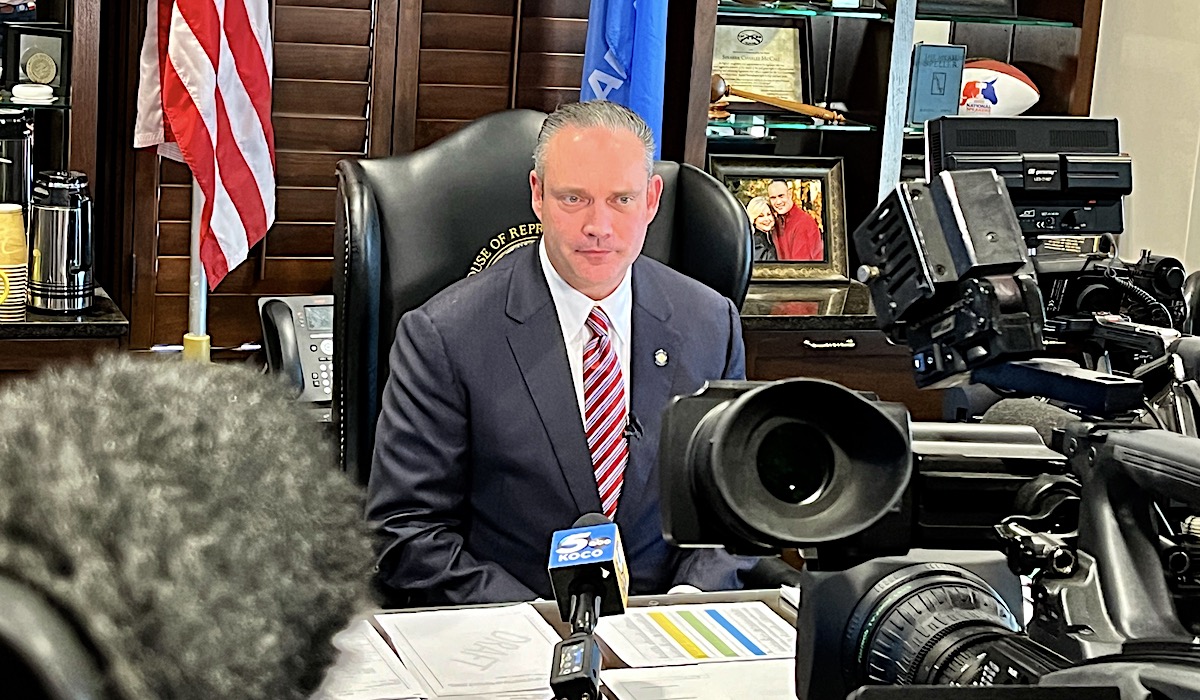
McCall’s original version of HB 1935, which House members have tied to HB 2775‘s proposal of a $500 million increase in public school funding, would create a new $5,000-per-child refundable tax credit for parents who send their kids to private schools. The bill would also create a $2,500-per-child tax credit for families who homeschool their kids. Both tax credits would be refundable, meaning families could receive cash payments from the state beyond their tax liabilities.
After they received the two bills, senators added a number of amendments. Those included increasing the private school tax credit to $7,500-per-child and decreasing the homeschool tax credit to $1,000 per family. Additionally, the Senate added a household income cap of $250,000 for families looking to take advantage of the potential tax credits. In HB 2775, senators made significant changes to how teacher raises and other new public school funding would be handled.
But both bills are back to their original language after the House rejected the Senate amendments Monday, as anticipated. The bills will continue to be negotiated between the chambers, with the Senate’s proposed income cap on tax credit eligibility looming as one of the major points of disagreement.
“The bill would not have passed the Senate without an income cap,” said Senate Education Committee Chairman Adam Pugh (R-Edmond). “So that was caucus feedback — the majority of the caucus.”
But McCall has indicated that HB 1935 might not be able to pass his chamber with an income cap.
“The problem with (an income cap) is it’s a form of class warfare,” McCall said April 5. “You can never say that every parent and student in the state of Oklahoma wins with an income cap.”
Without an income eligibility cap, the House version of the new refundable tax credit is estimated to have about a $300 million annual fiscal impact. Senate fiscal staff estimated the Senate version’s impact at about $100 million.
Neither estimate appears to take into account the tax credit costs associated with new students enrolling in private schools.
Legislators frustrated over lack of transparency
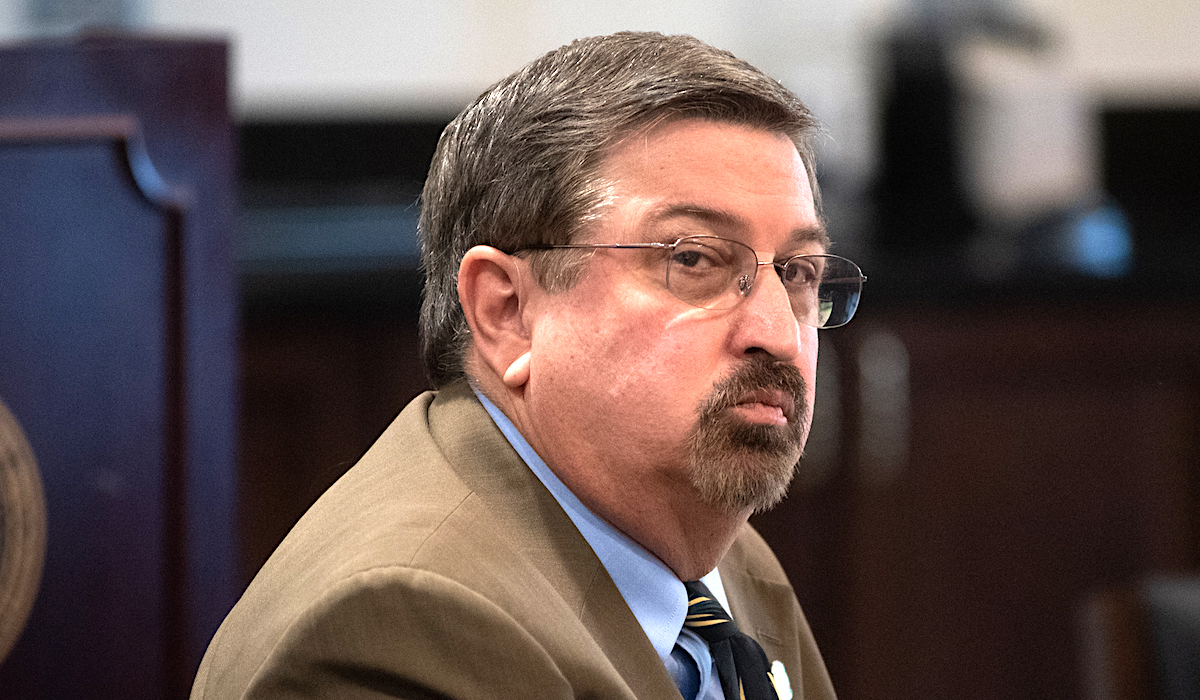
As HB 1935 heads to a conference committee to reconcile the differences in House and Senate versions, legislative leaders and the governor’s office have been discussing potential compromises in private meetings.
Regarding the proposed refundable tax credit for private school families, those ideas include an eligibility cap on private school tuition, prioritization of lower-income students during private school enrollment, and a phased-in implementation of the new credit where an income cap would apply for the first few years but would gradually go away.
“Obviously, there’s a lot of ideas floating around,” Pugh said.
The concept behind capping tax credit eligibility based on a private school’s tuition would be intended to keep some schools from simply raising their tuition to absorb the full tax credit, thus preventing access for additional families.
“Any idea that’s trying to serve kids and do this policy in the best way possible — just me personally, I’m open to, but that’s not a conversation that I’ve had with anybody,” Pugh said of capping the eligibility based on private school tuition.
Pugh said he would want to see specific language before determining whether he would support a concept.
Despite Pugh’s position as chairman of the Senate Education Committee, he seems to be in the same boat as many other education-focused legislators largely in the dark on where current negotiations stand between the tax credit bill’s two versions.
“I would say my frustration is the fact that that you’re coming to me and telling me what’s been negotiated, and I haven’t heard anything about it,” said Johns, a former Ada educator who called the idea “interesting.”
House Appropriations and Budget Education Subcommittee Vice Chairman Dick Lowe, who voted for the tax credit bill, agreed. He said that while he is open to new ideas, the only proposals he has heard have come from the “rumor mill.”
Lowe expressed frustration that the holdup in public negotiations on education funding was also delaying budget negotiations in other areas.
“We want this log jam to be gone,” said Lowe (R-Amber). “I feel like we’re holding up everything at the Capitol in a lot of ways because this is such a high percentage of the budget.”
The nuts and bolts of private school tax credit parameters
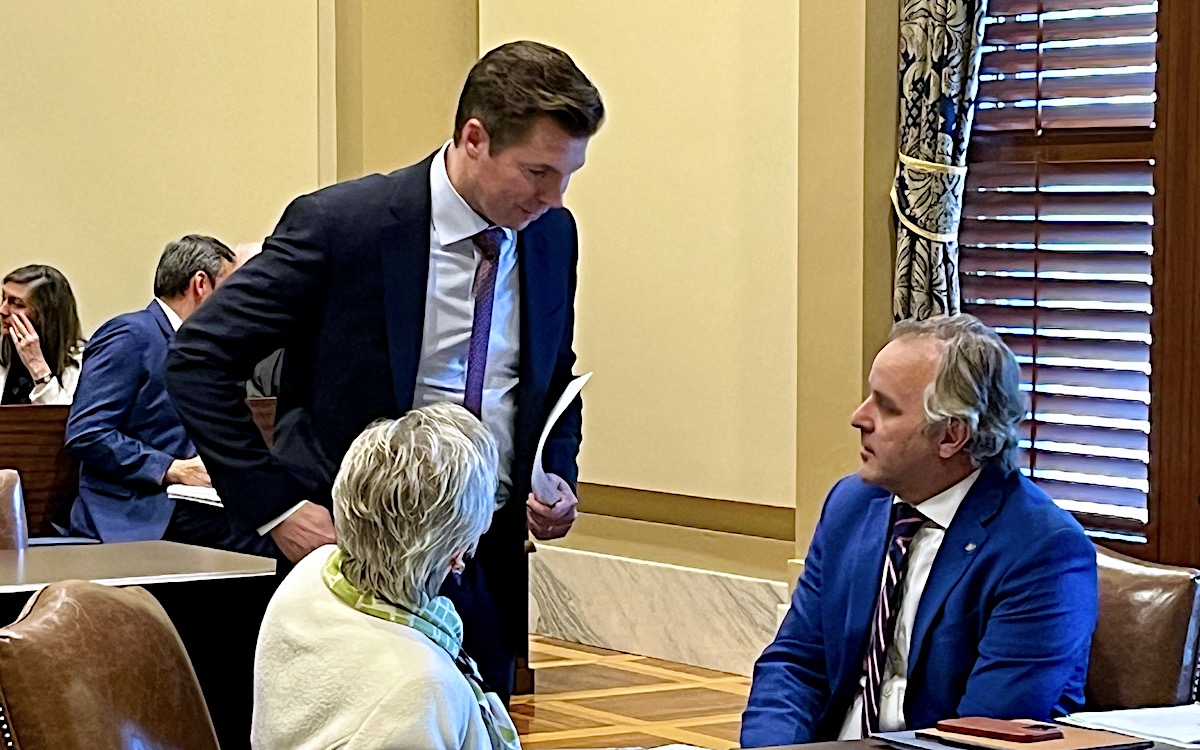
Asked about negotiations over the proposed tax credit bill, Kate Vesper, the governor’s press secretary, declined to discuss a potential private school tuition cap or any other specific idea being bandied about the building.
“Negotiations regarding education are ongoing, and the governor remains involved in those conversations,” Vesper said. “Gov. Stitt looks forward to getting something across the finish line for Oklahoma parents and students this session.”
While it is not yet clear what a proposed tuition cost cap could be — or if it will be proposed to House and Senate caucuses at all — it could bring the bill in line with Stitt’s stated goal of offering school choice to low-income families in addition to wealthy ones.
The state’s most established private schools have tuition costs well in excess of the proposed $5,000 or $7,500 credits. Casady and Heritage Hall in Oklahoma City cost $24,850 and $23,650, respectively, for grades nine through 12. Bishop McGuinness is cheaper, but it’s still in excess of the proposed state tax credits at $16,245 for non-Catholics and $11,445 for parishioners.
In Tulsa, Holland Hall and Cascia Hall cost $23,400 and $16,800, respectively, for high school.
But many other private schools across the state have tuition costs much closer to the proposed tax credit levels. Bishop Kelley and Metro Christian in Tulsa both charge around $12,700 for high school.
In the Oklahoma City area, schools like Community Christian School and Antioch Christian Academy have tuition levels below the Senate’s proposed $7,500 tax credit. Other schools are even lower, such as Drexel Academy in north Tulsa, where donations and state tax credits leveraged through the Opportunity Scholarship Fund allow the private elementary school to request only small donations or volunteer hours from families.
If Oklahoma’s Republican-dominated Legislature ultimately agrees on a tax credit plan and sends it to Stitt, it would represent a significant expansion of “school choice” in the state. Other states have taken similar steps recently.
Some states who have passed or are in the process of passing school choice legislation have opted to phase in their new laws over time instead of all at once.
In Iowa, the Republican-controlled Legislature passed a law to create Education Savings Accounts for families in January.
Currently, only the lowest income families and families with kindergarteners are eligible for the ESAs. Next year, higher income families will become eligible. By 2025, every family in Iowa will be eligible.
But some, such as Oklahoma State Superintendent of Public Instruction Ryan Walters, have argued for “comprehensive” and universal school choice as soon as possible.
Asked March 30 about the competing versions of Oklahoma’s tax credit bill, Walters declined to name a preference, but he did say he opposes an income cap and that he would only support school choice legislation that is “comprehensive.”
“I have the utmost confidence in the House and the Senate to come together and get this plan passed, but it has to be for every family,” Walters said. “We can’t carve out families. Every single one of these families deserves school choice — they all should have it this session, and we’re going to keep fighting for that.”
Stitt himself recently said that he is not in favor of capping the tax credits’ eligibility based on family income.
“I prefer no cap because we want to make sure that kids can go wherever they want,” Stitt told The Daily Caller on Monday. “They pay property taxes and we are going to fund the student. We don’t want to penalize them because they have rich or poor parents. What we’ll probably do is just say we’re gonna prioritize under $250,000, what the Senate has, or we’ll prioritize people below some level, and then after that we’ll say everybody can qualify.”
(Correction: This article was updated at 10:30 a.m. Thursday, April 20, to correct a typo in a subhead.)











